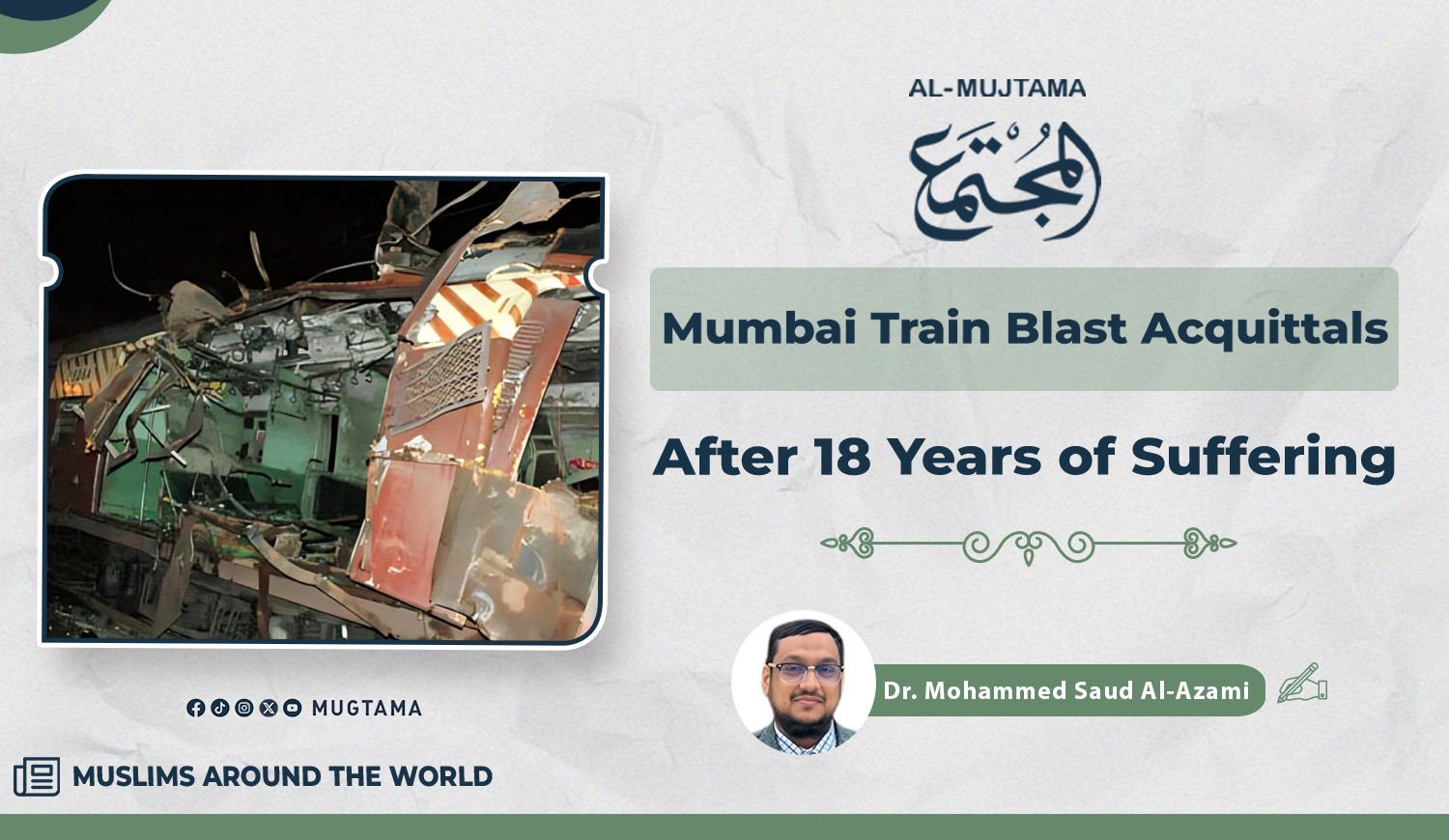Mumbai Train Blast Acquittals After 18 Years of Suffering

On a summer night in July 2006, a series of explosions ripped through Mumbai’s suburban trains, leaving over 180 people dead and hundreds injured. Within hours, investigators and the media were quick to present a ready-made narrative: a group of young Muslims, affiliated with banned Islamic organizations, had planned and executed the attacks. The story was presented as an undeniable truth. But after nearly two decades of imprisonment, torture, and exhausting legal proceedings, the verdict from the Bombay High Court on July 21, 2025, exposed the falsity of this account, declaring 12 men—long labeled as dangerous terrorists—innocent.
This case is not an exception. It reveals a long-standing
pattern of implicating Muslims in fabricated terrorism cases, where
intelligence and counter-terrorism agencies become political and security tools
used to find a convenient suspect, while the truth is buried in obscure files.
A Chapter of Tragedy: Mumbai 2006
When the bombings occurred, authorities were quick to point
fingers at a group of young men, mostly from low- and middle-income
neighborhoods. They were accused of receiving training in Pakistan and buying
pressure cookers from local markets to turn into time bombs.
In 2015, a special court sentenced five of them to death and
seven others to life in prison. It seemed the case was closed and justice had
been served. But in reality, this was a false justice, built on confessions
extracted under torture, fabricated testimonies, and investigations riddled
with holes. Now, 18 years later, the Bombay High Court has
stated clearly: the prosecution completely failed to prove its case, and the
confessions on which the verdicts were based are invalid and full of
contradictions.
Read also: Patriotism
or Fanaticism? Indian School Play Casts Burqa as a Symbol of Terror
Voices from Behind Bars: What the Acquitted Men Say
Waheed Sheikh, who was released earlier in 2015, spoke with a
trembling voice as he recalled the moment of acquittal: “We said from day one
that we were innocent. We lived years of hell. We were tortured, forced to sign
confessions we never made. Only today, after we have been broken from the
inside, does the court acknowledge the truth.”
Sohail Mahmood Sheikh, who spent 18 years behind bars,
described the moment he learned of the court's decision: “I couldn't believe my
ears when the lawyer said we were free. I thought of my mother, who passed away
while I was in prison, and I couldn't even say goodbye to her. What kind of
innocence can bring back those moments?”
The children and relatives of the acquitted men are
experiencing a mix of joy and bitterness. The son of Ali Sheikh, one of the
wrongfully convicted, said: “We grew up visiting prisons more than we visited
parks. My father missed the most important moments of our lives. Now he is
back, but who can compensate us for our stolen childhoods?”
The Recurring Scenario: Muslims as Scapegoats
The Mumbai case wasn't an isolated incident. Before and after
it, similar cases emerged, such as the 2006 Malegaon bombings, where dozens of
Muslims were arrested, only for it to be discovered later that the real
perpetrators belonged to extremist Hindu groups.
The pattern is consistent:
- Arbitrary
arrests targeting young Muslims.
- Ready-made
accusations of links to organizations like Lashkar-e-Taiba or the Taliban.
- Brutal
torture to extract confessions.
- Protracted
trials that often end in harsh sentences.
- Years
of imprisonment before a high or supreme court intervenes to say:
"There is no evidence."
Read also: India's
Ignorance Campaign: The Agenda Behind 'Saffron' Education
Intelligence Agencies: Between Security and Politics
Why does this scenario keep repeating? Experts believe there
are several reasons:
1. Political and Media Pressure: When an
attack occurs, authorities need a quick suspect to reassure the public.
2. Sectarian Bias: The stereotype of Muslims as
potential terrorists makes them easy targets.
3. Repressive Laws: Such as the Unlawful Activities
(Prevention) Act (UAPA) and the Maharashtra Control of Organized Crime Act
(MCOCA), which allow for long-term detention without trial.
4. Lack of Judicial Oversight: Security agencies are
granted broad powers with no real accountability.
Wounds That Don't Heal
What the court papers don't convey is the scale of the human
tragedy. Mothers passed away waiting for their sons to return. Children grew up
without fathers, deprived of affection and security. Families were impoverished
by legal fees and the cost of traveling to visit prisons. One relative of the
acquitted men expressed it bitterly: "Delayed justice is a double
injustice. We have lost years of our lives, and no one can compensate us."
The Aftermath of the Verdict
The Bombay High Court's decision doesn't just acquit the
accused; it implicitly condemns the performance of the investigative agencies.
It opens the door to uncomfortable questions:
- Who,
then, were the real perpetrators?
- Why
were two decades of innocent lives wasted?
- Will
the officers who committed torture and fabricated investigations be held
accountable?
So far, there has been no indication of accountability for
those involved, reinforcing suspicions that the matter will be hushed up, just
as previous cases were.
The 2006 Mumbai case exposes a dark side of the state's
relationship with Muslims in India—a relationship at times based on suspicion,
marginalization, and fabrication. The acquittal of 12 men after 18 years is not
a complete victory; rather, it is a painful reminder that justice can be stolen
for many years before it is finally restored.
But most importantly, this story raises a bigger question:
Will security agencies continue to look for a convenient suspect to close cases
quickly, or will a day come when honest investigations are conducted, and the
innocent are not sacrificed? Until then, the voices of Waheed Sheikh and his
colleagues will echo: “Our lives were lost, but we did not lose the truth.”
In conclusion, after nearly two decades of imprisonment and suffering, these innocent Muslim men were released from behind bars. They emerged with faces worn by time and hearts heavy with wounds, yet they held their heads high with their long-awaited innocence. The years in prison were not just a confinement of freedom; they were a stolen life, wasted dreams, children who grew up far from their fathers' arms, wives who struggled between the tears of loss and the harshness of society, and mothers who spent their lives sowing hope, praying to see their sons free before their own eyes closed forever.











